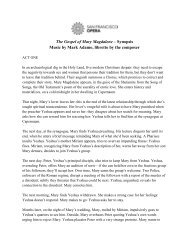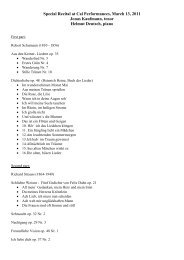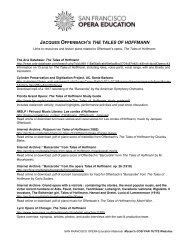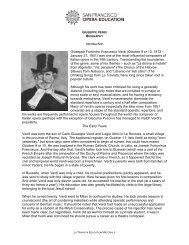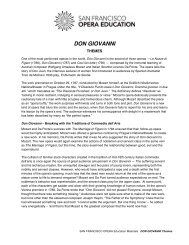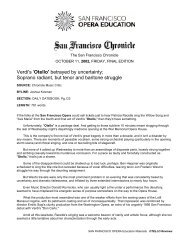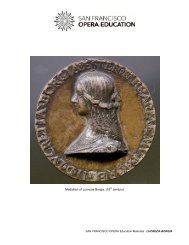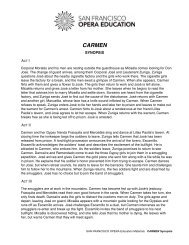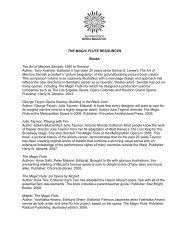The Rake's Progress Teachers Guide - San Francisco Opera
The Rake's Progress Teachers Guide - San Francisco Opera
The Rake's Progress Teachers Guide - San Francisco Opera
Create successful ePaper yourself
Turn your PDF publications into a flip-book with our unique Google optimized e-Paper software.
<strong>The</strong> Publications Coordinator then gathers these materials and works with the Dramaturg to determine<br />
which will be used in the development of the stage production and which may be used in written<br />
publications (such as the program). Dramaturgs may also do a musical analysis of the score to determine,<br />
for example, why certain musical phrases seem to characterize or contradict (subtextualize) the words or the<br />
situation of the libretto. In the rehearsal, the Dramaturg acts as an “editing eye,” providing valuable<br />
feedback and criticism of the day’s work; as the production evolves, he helps the director refer back to the<br />
“big picture” of the opera. A good Dramaturg enriches the creative process and helps the conductor, director<br />
and designer delve deeply into the work, “ask questions” of the piece and figure out potential connections<br />
that may be expressed in the final production.<br />
<strong>The</strong> Artistic Administrator works with the Music Director and the General Director in the hiring of<br />
singers. <strong>The</strong> Artistic Administrator deals with individual leading artists and their agents, making sure that<br />
they are available to sing with the Company and negotiating a salary and contract. Contracts are very<br />
important in opera because once the contract has been signed, it legally binds a singer to perform with the<br />
Company.<br />
Equally important as all of the artistic decisions, are the business choices that a company makes. <strong>The</strong><br />
Managing Director of a company is the person in charge of the business aspects. <strong>San</strong> <strong>Francisco</strong> <strong>Opera</strong>,<br />
like most performing arts groups, is a non-profit company. This means that the organization does not exist<br />
as a money-making business, but instead is a company that exists to present art, essentially functioning on a<br />
combination of ticket sales and fund-raising. Grand <strong>Opera</strong> is very expensive to produce. Because it is for<br />
the general public to enjoy, it is impossible to make enough money from ticket sales to cover the actual<br />
costs of producing it. Each year, budgets are formed to decide the guidelines that determine where money<br />
will be spent, so that no department exceeds the amount of money that the company can afford to spend.<br />
<strong>The</strong> Senior Director of Finance and Administration, along with the General Director and heads of the<br />
various departments, is responsible for making sure that budgets are formed and followed, and for keeping<br />
track of finances throughout the year, as well as generally overseeing the business end of the company.<br />
<strong>The</strong> Director of Development and the Director of Marketing work with the<br />
Managing Director to actively keep track of what money is raised. <strong>The</strong><br />
Director of Development heads the Development Department. This<br />
department raises money through donations, private and government grants.<br />
Some people in the Development Department are in charge of applying for<br />
grants for the company. Other people are in charge of securing corporate<br />
sponsorships. For-profit companies donate a certain portion of their profits to non-profit organizations that<br />
are working in their communities or that interest them in some way. <strong>The</strong>re are also jobs in the Development<br />
Department that deal with individual gifts. This means that an individual person or family gives a donation<br />
to the opera to support its programs.<br />
Of course, the other source of income for an opera company comes from Box Office sales. <strong>The</strong> War<br />
Memorial <strong>Opera</strong> House has 3,148 seats and averages more than 75 performances each year - which totals<br />
more than 236,100 seats that have to be sold every year! That’s a lot of seats! <strong>The</strong> Marketing Department<br />
is the division that makes sure the seats are sold each year. <strong>The</strong>re are many different parts of marketing<br />
opera. One is placing advertisements so that people know that the opera is around. Any ads that you see in<br />
the newspaper, at bus stops, on television, or hear on the radio, the Marketing Department put there. <strong>The</strong><br />
Marketing Department works with an<br />
outside advertising agency to determine what type of ad will be most successful in reaching the Company’s<br />
target audience, and to determine the costs of specifically placing<br />
ads in newspapers or with radio or television stations.<br />
43



